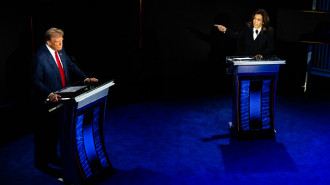John Kerry shines spotlight on Yemen during Riyadh meeting
The senior US diplomat said "to share ideas and initiatives for getting the political discussions back on track and trying to get a political solution", according to a senior State Department official.
He hopes to put in place mechanisms for delivering desperately needed humanitarian aid to the impoverished country where half of the 22 million population fall under the poverty line.
"It's not either-or. We want to get humanitarian access better ensured and at the same time we need a ceasefire in place. They go hand in hand but you need a reduction in violence," the official said.
The UN’s Yemen envoy, Ismail Ould Cheikh Ahmed, Britain's Middle East under-secretary Tobias Ellwood, and Kerry’s Saudi and United Arab Emirates (UAE) counterparts were present during the 30-minute meeting with the king.
There is "mounting pressure" from certain groups within the US government to see the war ended as soon as possible, Peter Salisbury, associate fellow at London's Chatham House think tank told AFP ahead of the meeting.
"However, the Americans are limited in their ability to produce a meaningful political settlement."
A diplomatic source in Riyadh who said it is "becoming increasingly clear" that the US administration is concerned by the rising civilian death toll, said he expected the visit to focus on pushing for fresh peace talks.
 |
Saudi-led coalition airstrikes were suspected of causing around half of all civilian deaths, while attacks by groups affiliated with the rebels were blamed for around a quarter of the deaths - UN report |
 |
"I'm pretty sure that's what the Saudis want as well," the source said.
The problem is that "there's no clear mechanism" for a way forward, he added.
Saudi Arabia is leading an Arab coalition battling Houthi rebels in Yemen.
More than 6,600 people, most of which civilians, have been killed since the coalition launched a military campaign in March 2015 to reinstate the internationally recognised government of Abdrabbuh Mansour Hadi.
On Thursday, a new UN report accused both the Arab coalition and Houthi rebels of grave human rights abuses before calling for the creation of an independent international body to investigate the violations.
Saudi-led coalition airstrikes were suspected of causing around half of all civilian deaths, while attacks by groups affiliated with the rebels were blamed for around a quarter of the deaths, the report said.
Kerry, who was in the kingdom on an official two-day visit, later met with the king's powerful son, Deputy Crown Prince and Defence Minister Mohammed bin Salman.
Global anti-IS alliance
The kingdom, along with its neighbouring Gulf allies, is involved in an international, US-led military alliance fighting the Islamic State group across Iraq, Syria and Libya.
The US official touched on ending the heavy bloodshed in Syria with the regional allies "because they do have influence" over opposition groups, the State Department official said.
The State Department official said earlier that Kerry's talks with the Saudis would likewise cover Libya, where a UN-backed Government of National Accord is challenged by a rival administration.
Pro-GNA forces are battling IS in Libya's coastal city of Sirte.
"What we're trying to do is to continue to support the GNA, work towards political solutions and making sure we're putting pressure on Daesh (IS) inside Libya," the official said.
Kerry was to focus on the same conflicts at a working lunch with ministers of the six-nation Gulf Cooperation Council which groups Saudi Arabia with its neighbours.
The US Secretary of State is due to travel towards Geneva to meet with Lavrov later on Thursday, to discuss efforts to establish a military cooperation against the common IS enemy, despite both Moscow and Washington standing on opposing sides of the five-year-old Syria conflict.
![Palestinians mourned the victims of an Israeli strike on Deir al-Balah [Getty]](/sites/default/files/styles/image_684x385/public/2024-11/GettyImages-2182362043.jpg?h=199d8c1f&itok=xSHZFbmc)


![The law could be enforced against teachers without prior notice [Getty]](/sites/default/files/styles/image_684x385/public/2178740715.jpeg?h=a5f2f23a&itok=hnqrCS4x)
 Follow the Middle East's top stories in English at The New Arab on Google News
Follow the Middle East's top stories in English at The New Arab on Google News

![Voters in Michigan [Getty]](/sites/default/files/styles/image_330x185/public/2182490468.jpeg?h=a5f2f23a&itok=XMi_sWGX)
